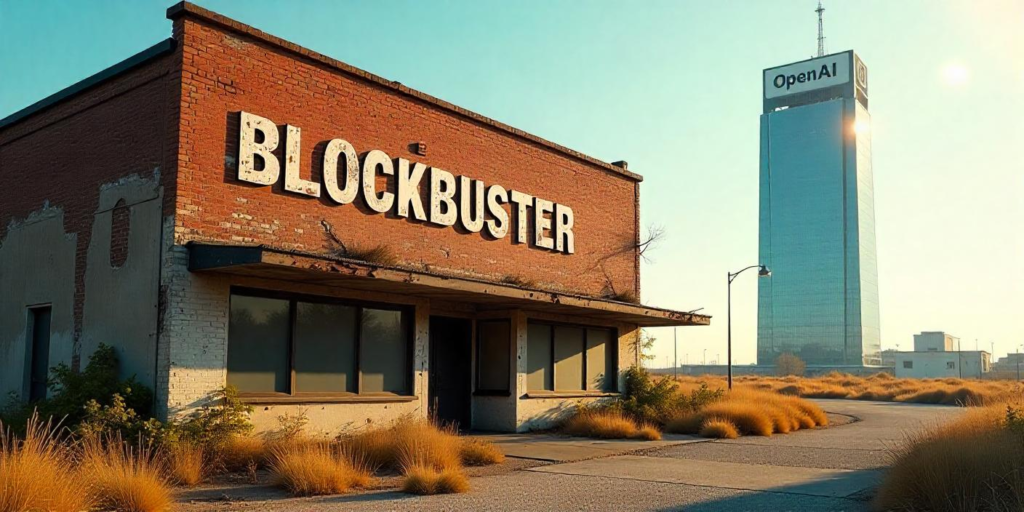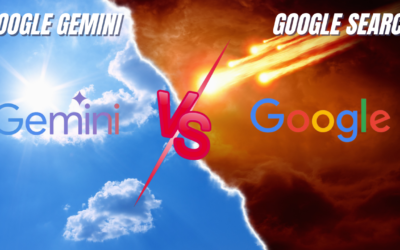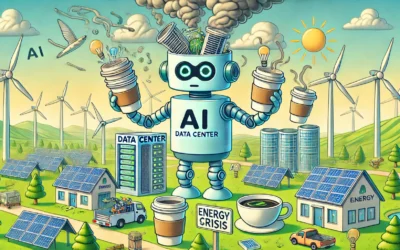Why Legacy Companies Are Doomed Without AI

Twenty years ago, the internet wasn’t just a tool; it was a revolution. Web 2.0—the era of user-generated content, social media, and cloud computing—completely transformed the business landscape. Companies that resisted this change were left behind, struggling to stay relevant while agile startups soared.
Remember Blockbuster? At its peak, it was the giant of home entertainment. Then Netflix came along, leveraging Web 2.0’s ability to stream content online, and Blockbuster’s refusal to innovate drove it straight into the ground. Kodak, a pioneer in photography, ignored the digital shift for too long, believing film would remain king. By the time they tried to catch up, it was too late. MySpace, once thought to be the future of social media, couldn’t keep up with Facebook’s ability to harness user-driven content and scale with Web 2.0 innovations. These companies were household names—unshakable, or so we thought. Today, they serve as cautionary tales of what happens when businesses refuse to evolve.
Fast forward to now, and we’re standing on the edge of a similar revolution: AI. Yet, some companies are making the same mistake—believing that AI is just another tool they can ignore or delay adopting. The hard truth? AI isn’t optional. Just like Web 2.0 redefined success in the early 2000s, AI will determine who thrives and who fades into irrelevance in this decade.
Back then, businesses were scrambling to launch websites and create social media profiles. Now, it’s about embedding AI in everything—from decision-making to customer service, operations to marketing. The companies that refuse to embrace AI are today’s version of those who never left the Web 1.0 era. They’ll be the Blockbusters and Kodaks of tomorrow.
Meanwhile, AI-native companies are emerging as the next generation of unicorns. Think OpenAI, the force behind ChatGPT, already reshaping industries by making AI accessible and integral to workflows. Anthropic, Cohere, Stability AI, and Hugging Face are just a few of the next-gen powerhouses already pushing the boundaries of what AI can do, from natural language processing to creative design. These companies are moving at lightning speed, building the foundations of a new economy, much like how Facebook and Google emerged as giants of Web 2.0.
Why are legacy companies doomed?
Because AI doesn’t just streamline processes—it redefines them. Companies that have already adopted AI are seeing operational efficiencies that outpace any human-managed system. They’re unlocking insights from data that traditional methods would have missed and automating tasks that took entire teams to manage.
And the speed of AI innovation? It’s blistering. What’s cutting-edge today will be standard tomorrow. The gap between AI-powered companies and those dragging their feet will grow faster than it did during the Web 2.0 revolution. If you’re not already experimenting with AI, you’re not just behind—you’re obsolete.
Just as Web 2.0 birthed giants like Facebook, Google, and Amazon, the AI era is producing its own titans. Legacy companies that refuse to adapt will see their market share swallowed up by startups who understand that AI isn’t a gimmick or luxury—it’s the foundation of the future.
The question isn’t whether AI will disrupt your industry—it’s how soon.
Ask yourself: Do you want to be the next MySpace, or will you be the next OpenAI?






